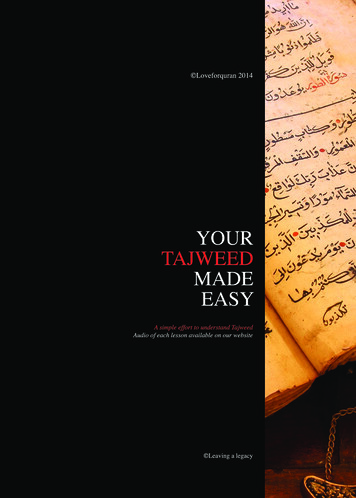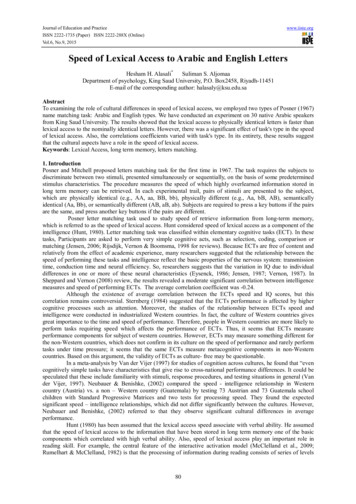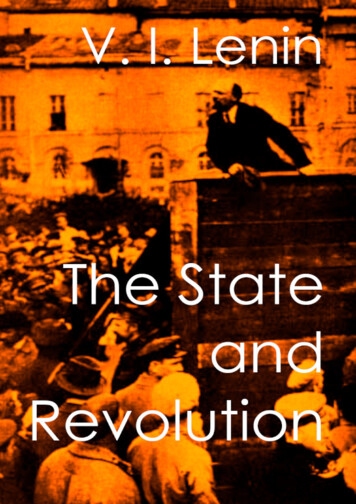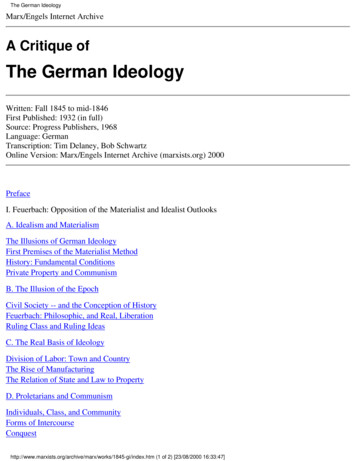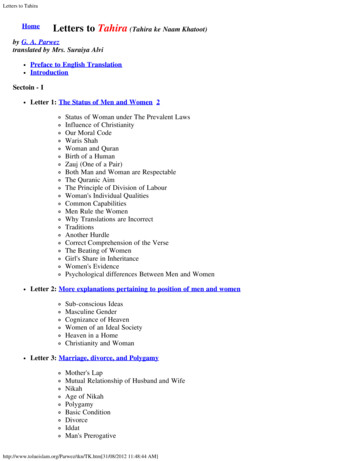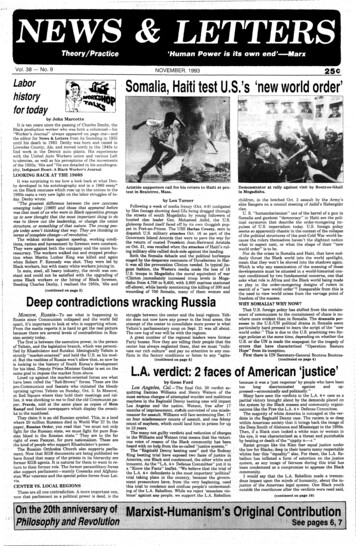
Transcription
NEWS & LETTERSTheory/PracticeVol. 38 - No. 9Laborhistoryfor todayby John MarcotteIt is ten years since the passing of Charles Denby, theBlack production worker who was both a columnist—his"Worker's Journal" always appeared on page one—andthe editor for News & Letters from its founding in 1955until his death in 1983. Denby was born and raised inLowndes County, Ala. and moved north in the 1940s tofind work in the Detroit auto plants. His experienceswith the United Auto Workers union and various Lefttendencies, as well as his perceptions of the movementsof the 1950s, '60s and '70s are detailed in his autobiography, Indignant Heart: A Black Worker's Journal.L O O K I N G BACK A T THE 1 9 6 0 SIt was surprising to me how a look back at what Denby developed in his autobiography and in a 1969 essay*on the Black caucuses which rose up in the unions in the1960s casts a very new light on the labor struggles of today. Denby wrote:"The greatest difference between the new caucusesemerging today [1969] and those that appeared beforewas that most of us who were in Black opposition groupsup to now thought that the most important thing to dowas to throw out the leadership, or change the unionstructure, or something of that nature. The young people today aren't thinking that way. They are thinking interms of complete change—of revolution."The wildcat strikes against speedup, working conditions, racism and harassment by foremen were constant.They were against both the company and the union bureaucracy. The workers walked out and stopped production when Martin Luther King was killed and againwhen Robert F. Kennedy was shot. They were led byBlack workers, but with many white workers joining in.In auto, steel, all heavy industry, the revolt was constant and could not be satisfied with the upgrading ofsome Black workers or the hiring of Black foremen.Reading Charles Denby, I realized the 1950s, '60s and(continued on page 3)'Human Power is its own250NOVEMBER, 1993Somalia, Haiti test U.S.'s 'new world order'K .J »kAAristide s u p p o r t e r s call for his r e t u r n t o Haiti a t prot e s t in Braintree, Mass.D e m o n s t r a t o r a t rally against visit by Boutros-Ghaliin Mogadishu.by Lou T u r n e rFollowing a week of media frenzy (Oct. 4-9) instigatedby film footage showing dead GIs being dragged throughthe streets of south Mogadishu by young followers ofhunted clan leader Gen. Mohamed Aidid, the U.S.globocop found itself faced off by its own thuggish puppet in Port-au-Prince. The USS Harlan County, sent todispatch U.S. military attaches Oct. 16 as part of theGovernors Island Accords that were to pave the way forthe return of ousted President Jean-Bertrand Aristideon Oct. 31, was recalled when the attaches of Haiti's ruling military elite rallied dock-side against the landing.Both the Somalia debacle and the political burlesquestaged by the desperate remnants of Duvalierism in Haiti was all the provocation Clinton needed. In typical jingoist fashion, the Western media made the loss of 18U.S. troops in Mogadishu the moral equivalent of war(Clinton immediately increased troop levels in Mogadishu from 4,700 to 6,400, with 3,600 marines stationedoff-shore), while barely mentioning the killing of 300 andwounding of 700 Somalis, many of them women andchildren, in the botched Oct. 3 assault by the Army'selite Rangers on a council meeting of Aidid's Habergidirclan.U. S. "humanitarianism" out of the barrel of a gun inSomalia and gunboat "democracy" in Haiti are the political oxymoron that describe the order-mongering impulses of U.S. imperialism today. U.S. foreign policyseems so apparently chaotic in the context of the collapseof the political structures of the post-Cold War world because the rulers themselves haven't the slightest notionwhat to expect next, or what the shape of their "newworld order" is to be.Nor do the crises in Somalia and Haiti, that have suddenly thrust the Black world into the world spotlight,mean that they won't be shoved into the shadows again.Which is why any examination of the meaning of thesedevelopments must be situated in a world-historical context conditioned by two fundamental concerns, one thatasks what role is Africa and the Black world being madeto play in the order-mongering designs of rulers insearch of a "new world order"? Inseparable from this isthe need to view world crises from the vantage point offreedom of the masses.WHY SOMALIA? WHY NOW?Deep contradictions wracking RussiaMOSCOW, Russia—Tosee what is happening inRussia since Communism collapsed and the world fellapart, it's important to look at who is supporting whom.From the media reports it is hard to get the real picturebecause there are several levels of contradiction in Russian society today.The first is between the executive power, in the personof Yeltsin, and the legislative branch, which was personified by Khasbulatov and Rutskoi. Ideologically Yeltsin isstrictly "market-oriented" and held the U.S. as his model. But the realities of Russia won't allow that, so now heis looking to the history of South Korea's developmentfor his ideal. Deputy Prime Minister Gaidar is set on thesame goal to impose the market from above.Lined up against the market-oriented forces are whathave been called the "Red-Brown" forces. These are thepro-Communists and fascists who initiated the bloodyuprising ag?insl Yeltsin on Sunday, Oct. 3. In Moscow,at Red Square where they hold their meetings and rallies, it was shocking to me to find the old Communist paper, Pravda, sold at the same place as copies of MeinKampf and fascist newspapers which display the swastika in the masthead.They claim it is an old Russian symbol. This, in a landwhere 20 million Russians died in World War II! In thepaper, Russian Order, you read that "we must not onlyfight for the Russian state, we must fight for pure Russian blood in the Russian state." They are to the farright of even Pamyat, for pure nationalism. These arethe kind of people who support Khasbulatov's power.The Russian Orthodox Church also supports parliament. Now that KGB documents are being published wehave found that many of the priests in its hierarchy areformer KGB agents. It is natural for them to want to return to their former role. The former paramilitary forcesalso support parliament—mainly Cossacks and Afghanistan War veterans and the special police forces from Latvia.CENTER VS. LOCAL REGIONSThese are all one contradiction. A more important one,now that parliament as a political power is dead, is theend9—Marxstruggle between the center and the local regions. Yeltsin does not now have any power in the local areas; theattempt of the center to consolidate more power is whatYeltsin's parliamentary coup on Sept. 21 was all about.The new tug of war will be with the regions.A great number of the regional leaders were formerParty bosses. Now they are telling their people that thecenter has always neglected them, that we must "cultivate our rich culture" and pay no attention to any conflicts in the factory conditions or listen to any "agita(continued on page 5)That U.S. foreign policy has shifted from the containment of communism to the containment of chaos is nowhere more evident than in Somalia. The dramatis personae in the U.S.AJN political drama in Somalia seemparticularly hard pressed to learn the script of the "newworld order." This is due to the U.S. practicing two foreign policies at the same time, depending on whether theU.S. or the UN is made the scapegoat for the tragedy oferrors that have characterized "Operation RestoreHope" from its inception.First there is UN Secretary-General Boutros Boutros(continued on page 4)LA, verdict: 2 faces of American 'justice'by G e n e FordLOS Angeles,Cal.—The final Oct. 20 verdict acquitting Damian Williams and Henry Watson of themost serious charges of attempted murder and maliciousmayhem in the Reginald Denny beating case will impactLos Angeles and the nation. Watson, free after 17months of imprisonment, stands convicted of one misdemeanor for assault. Williams will face sentencing Dec. 17on four misdemeanor counts of assault, and one felonycount of mayhem, which could land him in prison for upto 10 years.The many not guilty verdicts iand reduction of chargesin the Williams and Watson trial means t h a t t h e victorious voice of reason of the Black community has beenheard with no help from the so-called "justice system."The "Reginald Denny beating case" and the RodneyKing beating trial have exposed two faces of justice inAmerica, one Black and condemned, the other white andinnocent. As the "L.A. 4 Defense Committee" put it ina "Know the Facts" leaflet: "We believe that the trial ofthe L A . 4 defendants is the most important 'political'trial taking place in the country, because the government prosecutors have, from the very beginning, usedthis trial to condemn and confuse people's understanding of the L.A. Rebellion. While we reject 'senseless violence' against any people, we support the L.A. Rebellionbecause it was a 'just response' by people who have omically and politically."Many have seen the verdicts in the L.A. 4 case as apartial victory brought about by the demands placed onthe system by the Black masses and community organizations like the Free the L.A. 4 Defense Committee.The majority of white America is outraged at the verdicts in the Reginald Denny case. The racism is so deepwithin American society that it brings back the image ofthe Deep South of Alabama and Mississippi in the 1950s.Then, if a Black man looked a white man or woman inthe eye, it was characterized as a threat and punishableby beating or death of the "uppity n—-r."Racist groups like the Klan fear equal justice underthe law for Blacks; deep in their hearts many respectablewhites fear this "equality" also. For them, the LA. Rebellion has inflicted a form of extortion on the justicesystem, as any image of fairness during this trial hasbeen condemned as a compromise to appease the Blackcommunity.I would say that the L.A. Rebellion made a tremendous impact upon the minds of humanity, about the injustice of the American legal system. One Black youthoutside the courthouse after the verdicts were read said,(continued on page 10)
Page 2NEWS&NOVEMBER, 1993LETTERfS Woman as Reason [ Feminism faces nationalism's dual natureby T e r r y MoonThe Women's Liberation Movement is compelled tohave intense discussions on the genocidal war waged bySerbia on Bosnia. This is not alone because of the unprecedented nature of the rapes and murders being carried out by Serbian soldiers against tens of thousands ofmostly Muslim women—Croatian and Bosnian. It is alsobecause these events have fragmented the feministmovement that thought it was united in the Balkans andcaused hot disputes in the U.S.When Communism fell in East Europe, the women'smovement in Yugoslavia flowered. With the rise of narrow nationalism and independence of Slovenia, Croatiaand Bosnia, the feminism that was flowering began toshatter—especially when war broke out."Completely new questions appeared" wrote feministsfrom Belgrade in 1992. "Can a feminist be a nationalistchauvinist? Can a pacifist be a nationalist? Is a weaponan instrument of defense? Should the groups take clearattitudes towards nationalist questions, and thereforethe war, and in that way lose some women?"The same questions are being played out in the U.S. InSan Francisco, some U.S. and Balkan women refused tosupport the tour of two Bosnian women. It was also seenin the heated arguments after the "Mother Courage I I "tour that focused on women raped in wars.Reasons given for not supporting the Bosnian women's tour echo the splintering in the Balkans:. Bosnianwomen demanded a lifting of the arms embargo; they insisted the rapes now reach a deeper level of degeneracythan women experienced in war before; they defend theirgovernment. On the other hand, those who critiqued the"Mother Courage I I " tour sponsored by MADRE said itobscured the specificity of the rapes; it didn't recognizethat nationalism takes different forms.Why, just when it is most needed, has there been solittle mass outcry to stop the murder of the Bosnian people? There are dedicated groups of women working tostop the slaughter and help the victims of the war. Butwhere are the big demonstrations?This situation reveals that feminism has been unableto meet the challenge that we are facing in this changedworld of emerging neo-fascism, on the one hand, and thestruggle for a new multi-ethnic society, on the other.That is why there is so much debate. I am not the onlyone asking, how can it be that the Women's LiberationMovement that was so grounded in freedom that it critiqued the Left's narrow concept of revolution, insistingwe would not wait until after a revolution to demand ourfreedom, could not know how to respond to genocide?Are we confused about nationalism because it has adual character? What women have established—fromEast Timor to El Salvador and from South Africa to theUSA—is that when a national struggle is about genocideBalkan women empoweredEditor's note: Recently two Chicago women whofounded the Balkan Women's Empowerment Project visited Zagreb, Croatia, to set up a women's center called"NONA." They report the following:We arrived in Zagreb with 100 books on topics of vitalinterest to women, i.e., rape, recovery, women's health,women's rights. These books, and an additional 1,000are contributions from women throughout the U.S.The Zagreb-based directors of NONA conceive of thecenter as a safe and stimulating environment in whichwomen of all backgrounds, especially displaced and refugee women, can work together to improve their lives inthese difficult times for the people of Croatia and Bosnia-Herzegovina. Included in the plans are a library, adatabase of job and educational opportunities, and an archives on the pre-war, wartime, and post-war experienceof women In Croatia.During our visit we achieved closer relationships withlocal women's groups that will be supporting and usingNONA. Among them are the Zagreb women's groupKareta, and two Bosnian women's organizations in exile,Zene-BiH and BISER. We shot video footage of Zagreband interviewed Bosnian and Croatian women. We planto create a documentary to promote the center. We arealso beginning to outline plans for a similar project inZenica in Bosnia-Herzegovina.and land grabbing we oppose it; when it is about freedom, women not only fight for it, we deepen it.That was clear in the statement of the National BlackFeminist Organization in 1973: "We will remind theBlack Liberation Movement that there can't be liberation for half a race." At the 1993 UN h u m a n rights conference 20 years later, Rana Nashashibi, a Palestinian,emphasized that "Palestinian women and children wereabove all victims of violence in the home." That doesn'tmean she doesn't support the Intifada—she's a leader ofit—it means she wants total freedom.Concerns over Muslim fundamentalism is one reasonsome U.S. and Balkan feminists have refused to supportthe Bosnian struggle. But most Bosnian Muslims are notfundamentalists. Their struggle is to preserve the multiethnic way of life t h a t for centuries marked their society.The first shots fired in Sarajevo were at Serb, Croat andMuslim Slavs—200,000 strong—shouting, "We want tolive together!" Aida, one of the Bosnian women on tour,said, "There is no one of us who has not members of another group in the circle of her family."The international Women's Liberation Movement wasthe first and most vocal group to protest t h erape/murders and genocide. Would we have not only sustained our solidarity but deepened it if we saw how reallynew—new in the sense of a beacon for the future—waswhat the Bosnian people are fighting to maintain?When the Women's Liberation Movement arose wemade" a contribution to how deep and total a revolutionmust be because we demanded it mean our freedom too.Our vision of the future included totally new human relations—especially between women and men—a newworld. The Bosnian people are fighting for that kind ofunique contribution to "new human relations." Don'twe want to fight for that idea of freedom too?, 'i 1 : ,1. « m ss fmm fH iiSm!«SV: :Sister: Namibia is an international women'snewsjournal full of political analysis, book reviews, poetry, and essays, published by the "Sister Collective." Articles cover Namibia, South Africa, other countries in Africa, Asian women's struggles, and women in Bosnia. It ispublished in Oshiwambo, Afrikaans (to reach "coloured"women) and English. The July/August 1993 issue takesup child support, rape, Black* South African novelist Bessie Head. It has poetry on abortion rights and an articleon Alexandra Kollontai's writings on women's liberationand socialism. The magazine seeks links with women'sliberation groups and individuals. Write to Sister Collective, P.O. Box 40092, Windhoek, Namibia. —Diane LeeTo rediscover the energy and commitment thatbrought us to feminism, read the new Russian feministmagazine, Women and Earth. EditorTatyanaMamonova, a founder of Russian feminism, states thatthe magazine was begun to reawaken Russian women'sfeminism, long suppressed, and to educate women in theWest about feminism in the CIS.The report on the Independent Women's Fora in Russia was of special interest. Hundreds of women grappledwith challenging questions including the need to exorcisethe Soviet-perpetrated stereotype that feminine virtueequals self-sacrifice and submission. Write: 70 TerryRoad, Hartford, CT 06105-EileenMother Jones' publication of Karen Lehrman's article"Off Course" enraged me. Lehrman, author of work on"postideological feminism," maligns women's studies fordragging down the academy by rewarding students whoshare personal experiences of oppression. She attacks"the degree to which politics has infected women's studies scholarship," derides such politics as "ideology" andquotes someone calling it "fundamentalism."She champions right-wing students who feel intimidated in class and attacks multiculturalism as dogma.Mother Jones promises a response by Susan Faludi, au thor of Backlash. But why print this attack—disguisedin words like "postideological?" Mainstream media haverushed to hail Lehrman's essay in this "left-wing magazine" (see Cleveland Plain Dealer 9/18/93).-L.C.Wisconsin conference confronts barriersKenosha,Wis.—The 18th Annual University ofWisconsin System Women's Studies Conference—titled"How Women Make Change: The Impact of Feminism",held at University of Wisconsin-Parkside Oct. 7-9— blossomed into a two-day, two-way dialogue among 250women from the generally distant worlds of feminist academia and grassroots organizing.It was remarkable how many participants were involved with ongoing projects about domestic violence,sexual harassment, and other issues, on and off campus.While women of color remained a small minority, theconference planners had invited several Black women involved in community groups in Chicago to participate.The keynote address by Nikki Giovanni, the noted African American poet, was paired with a "Community Reaction Panel" which emphasized the urgency of issuesshe discussed, from health care to Somalia. She critiquedHillary Clinton's health care plan and underlined t h ecrisis poor Americans face by sharing a memo she hadreceived at Virginia Tech about a student who will haveto drop out of school because he has tuberculosis.At one session an academic woman critiqued the National Women's Studies Association for not having Blackwomen in its leadership historically, and the discussionturned to how such barriers could be actually brokendown. A Black woman from a Chicago community organization who told me she has avoided women's studiesconferences because of barriers of race and class, remarked enthusiastically t h a t this was the first time shehad seen such a desire to confront this elitism."Every time people tried to surface issues, like domestic violence," she said, "there were women thirsty to discuss them. Everyone was questioning life and looking atsocial justice in a larger picture."Others raised objections about academic papers isolating their subjects from such a "larger picture." Twocommunity health activists from Chicago critiqued sociology papers which wrenched one factor out of the fabricof thejr neighborhood and the racist politics of society. Perh'aps the most important aspect of the conferencewas the insistence on continuing the dialogue.—Laurie CashdanLatina writes of freedomLos Angeles,Cal.—l usually call myself a Latinalesbian, although I was born in Mexico and raised herein a Chicano environment. Expressing national identityis about creating a sense of community. But there's atendency in the RAZA movement to reject people whodon't take on the labels "Chicano" or "Mexicano."When I first came to the U.S., Chicanos put me downfor not knowing English. I didn't identify with Chicanosuntil I experienced how it feels to be a minority within acountry, which had not been the case in Mexico. Sincethen my life has differed from the life of a Mexicana inMexico and been more like the life of a Chicana.The sexism and homophobia I encounter in the Chicano-Mexicano movement has also kept me from becomingtotally involved. How can Chicano men cry oppressionwithout looking at their own behavior? Many of us ingay communities here differentiate ourselves by associating on a broader level culturally and identifying as Latino gays and lesbians. As an oppressed group Latinos as awhole need to respect and take in our differences.The term "feminism" has been used so many ways.Some feminists take the ground of conservatives whodiscount them with accusations of lesbianism by responding, " B u t I'm married." Some discount race andclass. In Mexico women call themselves feminists, butthey may be of a higher class than women of the massesand may not fully represent their needs.I had the experience of living in a commune of lesbiansof color. I worked with other women for our basic survival and learned how capable I am when men aren't thereto do the plumbing and cut the wood, when men's criteria don't enter into the picture. It became clear how thedivision of labor by sex is wrong, how our limitations arein great part imposed on us.When women work together they begin to find wordsto challenge men and women who disregard women'sthoughts and experiences. This to me is "Women as Reason." It involves taking responsibility and risking ramifications such as the disruption of homes.For lesbians, "coming out" means we have to defineourselves more fully than by our sexual orientations. Wehave to take responsibility for our love for women andour consciousness of women's experiences by developingbehaviors that do not reflect the power structures we often see in straight couples. It isn't easy.Lesbians need their own space together. But I don'tsee"private enclaves" as truly productive in terms of social change, a freedom movement. Both straight and lesbian women have something to offer a freedom movement due to their particular experiences. But for that tohappen dialogues have to take place. We need to listen toone another, ask questions and find new ways to defineour different and shared experiences as women. Maybewe still have a lot to mamwmmir-by Mary J o GreyAn 8l-member coalition of women's groups formed Sept.24, to make its "voice heard over that of the anti-choice,extreme right." The group has launched a grassrootscampaign to ensure that abortion services are includedin Clinton's health care reform plan. Currently, the proposed plan does not mention abortion.'* * *The rise of Muslim fundamentalism in Nigeria is endangering "unescorted" women's lives, especially in Lagos.Women's groups have decried a proposed anti-prostitution law which would impose on prostitutes five-year jailsentences, high fines and beatings. Male vigilantes havealready begufi to; stone women walking alone in thestreets.* * *More than one million women public service workershave united to form UNISON, one of the largest unionsin Europe. Inez McCormack, UNISON leader in Northern Ireland, says the union "will be a power.to reshapesociety for all women.a power used to challenge thisgovernment's attack on uri b l i c services.(from) thei90-year-old who has lost home nelp hours.'(to the) clo-!sure of a major hospital or school." —Information fromWomen's News, Irish feminist magazine
NOVEMBER ?1993NEW&--&-LETTERS,Delta Pride issues: time and moneyIndianola,Miss.—Wehave been in negotiationswith Delta Pride Catfish for over six weeks, and we haven't even gotten to the economic issues yet. The newmanagement team that the company hired after the1990 strike was supposed to be more reasonable, butthey have been fighting us over everything. They keepsaying that the company is in financial trouble, so weshould back off our demands.There are still several points where there is no agreement on non-economic issues. The most important issues are about time. One is start-up time and finishingtime. The way it is now, you never know when you startwork what time you will finish. You never know for surewhat time you will start the next day until the day before. You can't plan your life; they are taking all of yourtime. We asked for weekly schedules. They said no. TheyWorkshop Talks(continued from page 1)'70s were marked by tremendous labor struggles, ofwildcats against the inhumanity of production andagainst the labor bureaucrats, who w e r e the very onesordering the workers back to work and picking off themilitant workers t o be fired by the company!if this history is "forgotten" by or bothersome to laborleaders, it is not forgotten by the leaders of General Motors, Ford and Chrysler. When capitalism shut down Detroit, moved all the factories away and created the "rustbelt" in America, it was never just "economics," competition with Japan. It was the capitalists reacting to thatunending, growing revolt of the Black, urban Americanproletariat—who were inspiring more and more whiteworkers, as you see in Denby's account.Doesn't the Black struggle still inspire us in ways wemay not even be conscious of? The Caterpillar workers'slogan, "No contract, no peace!" is inspired by the "Nojustice, no peace!" of the Black struggles of the 1980sand today.Denby's view of the labor revolt of the 1960s and '70salso sheds light on who the so-called "underclass" is. Farfrom being "welfare bums," they are part of the workingclass, that part rejected by capitalism for being too rebellious.DOING AWAY W I T H W O R K E R SLook at how the owners of Delta Pride Catfish in Mississippi (see News & Letters, May 1993) responded tothose Black workers' union struggle by investing millions of dollars in automated machinery that was supposed to do away with them! It didn't work—this time.Look at how the growers responded to the farm workers'union by developing machines to pick the vegetables.Just as in Detroit, automation and plant closings arenever just a response to the "cost" of labor, but above allto the rebellion of the laborers, who are then throwninto permanent unemployment. Capitalism wants to doaway with us. But as Marx showed, capitalism is stuck,because only living human labor can enrich it. And theunemployed have no intention of sitting idly by, as theLos Angeles rebellion shows.The rulers have not forgotten why they abandonedDetroit and how white labor was beginning to move, too.That is precisely why the videotape of Reginald Dennybeing beaten was broadcast over and over to give out themessage that the rebellion was not a working-class revolt of Blacks, Latinos and some whites, but some kindof anti-white Black riot. I am glad Denny seems to bebucking efforts to use him that way, like when he embraced the mothers of those accused of attacking him.What I want to see is: can we find ways for our struggle as employed labor to join up with the struggles ofthis unemployed labor which capitalism has thrown outbefore t h a t becomes the future of all of us?* "Black Caucuses in the Unions" is available as the appendixto American Civilization on Trial. To order that pamphlet andIndignant Heart: A Black Worker's Journal, see the literature ad on page 9."I consider my life story as part of thewide struggle forfreedom."INDIGNANTHEARTA BlackWorker'sJournal by Charles DenbyTo order, see l i t e r a t u r e ad on page 9.world-aren't the ones who have to arrange child care.Then there is the way they can send you from one department to another. They have been abusing a clause inthe contract that was intended to help out in emergencies. You can work from 8 a.m. to 7 p.m. doing hard anddirty work on the kill line, and then they tell you to go toanother department like freezer and stay until 9:30. Wewant the right to say yes or no, if we have alreadyworked our eight hours.Then there's time for funeral leave. We asked forthree days off, but they refused even one day. They camein with figures showing how much one day would costthem, but the figures were based on each worker havingone member of their immediate family die each year. Itinsults our intelligence.Now we are finally going to discuss wages and benefits. They say we have to help the company grow, butI've been here 11 years getting measly pay while thecompany grew. Now we need to grow. This contract hasto end Mississippi poverty wages. It is our third contract,and we still have workers with eight years senioritymaking 5.15 an hour on jobs that leave you in pain atthe end of every day. How can this be called living?Every Thursday night we have a meeting at the unionhall to report on negotiations, and 200 workers come,sometimes a lot more than that. We are ready to fight,even though we have been working short weeks sincelast Spring. No one has money; it's hardest on the kids.The company is still tryin
per, Pravda, sold at the same place as copies of Mein Kampf and fascist newspapers which display the swasti ka in the masthead. They claim it is an old Russian symbol. This, in a land where 20 million Russians died in World War II! In the paper, Russian Order, you read that "we must not only fight for the Russian state, we must fight for pure Rus sian blood in the Russian state." They are .

